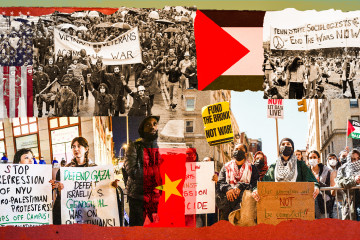
Dormitory: Growing up in turbulent Turkey in the late 1990s

Nehir Tuna’s debut feature, titled Dormitory, is an engaging coming-of-age drama set in Turkey between 1996 and 1997. Interestingly, the story unfolds at a time when tensions between religious and secular Turks are increasing, a few years before Recep Tayyip Erdoğan’s rise to power.
A co-production between Turkey, Germany and France, the picture was world-premiered in the Orizzonti strand of this year’s Venice Film Festival (30 August-9 September) and will take part in the national competition of the Antalya Golden Orange Film Festival next month (7-14 October).
Penned by the Tekirdağ-born filmmaker himself, it centres on fourteen-year-old Ahmet (Doga Karakas), who has been sent by his recently converted father (Tansu Biçer) to an Islamic dormitory (a so-called ‘yurt,’ which is also the Turkish language title of the film) to learn the true Muslim values. We realise that the decision to send his son to the dormitory is not that genuine, but it is mainly prompted by his desire to find personal redemption.
"Tuna’s semi-autobiographical approach is ultimately rewarding, as he gifts the audience with a hard-hitting tale which feels realistic and ‘cruel’ enough"
At first, Ahmet works hard to be the perfect son, while finding himself in a very different environment – his family is of a middle-class background. After some time, however, we see him having trouble fitting in with the rough kids at the dormitory.
Besides, the boy feels isolated in his day secular school, where he hides his new home from his classmates. The contrast between the more liberal, modern school and the oppressive atmosphere of the dormitory is also rendered by the language he speaks in the two environments: in the former, he is often seen learning English; in the latter, he speaks Turkish.
Ahmet seems to find fun and relief only after befriending Hakan (Can Bartu Aslan), a street-smart kid who knows how to break the rules of the dormitory’s strict system. Their shared desire for freedom, while facing an oppressive present and heading towards an uncertain future, makes their bond stronger and stronger.
More than two-thirds of the film is lensed in black-and-white before the image turns to colour. Even though Florent Herry’s cinematography may at first glance be perceived as a pretentious or unjustified aesthetic choice, we later discover that the lack of colour is a simple – yet effective – metaphor of the boundaries imposed by the dormitory, wherein Ahmet and other boys his age are not allowed to express themselves freely and are forced to perform a series of rites and tasks which end up alienating them.
Once Ahmet and Hakan manage to set free, a vibrant and colourful outer world awaits them. This chromatic shift comes together with a more dynamic camera work, which creates a stark contrast with the more controlled approach displayed in the black-and-white scenes.
|
Moreover, the first sequence depicting Ahmet and Hakan’s breakthrough is accompanied by Nada Malanima’s 1969 pop hit Ma che freddo fa – a surprising yet meaningful addition since part of the song’s lyrics delivers a rather carefree vibe.
The two lead actors’ performances are also quite convincing. Karadas imbues his role with the right balance of sense of duty and recklessness, whilst Aslan nails the working class ‘slyness’ and the tough skin his part requires.
All in all, Tuna’s debut exploits many of the coming-of-age tropes (the protagonist’s first love interest, close friendships, the presence of a strict school environment) but he successfully frames them within the turbulent socio-political context of late 1990s Turkey. This bold choice results in a viewing experience that is far from being sugar-coated and filled with clichés typical of the genre.
In his director’s statement, Tuna reveals how profound the connection with his lead character and the events depicted is. “Just like Ahmet, I’ve spent five years in a religious boarding school. I keep abiding memories of this experience, and most of them are quite similar to what Ahmet is going through being brutally separated from one’s family, and having to get used to new living conditions overnight. […] Just like I was, Ahmet is a hard-working student, who doesn’t rebel much and who wants to please everyone, especially his father. He is also really resilient: he knows that time will prove him right,” he says.
Tuna’s semi-autobiographical approach is ultimately rewarding, as he gifts the audience with a hard-hitting tale which feels realistic and ‘cruel’ enough.
Furthermore, the closure of the narrative arc comes almost as a surprise, as it may disclose more – or just spark more doubts – about the bond between Ahmet and Hakan.
Davide Abbatescianni is an Italian Film Critic and Journalist based in Rome
Follow him on Twitter: @dabbatescianni


